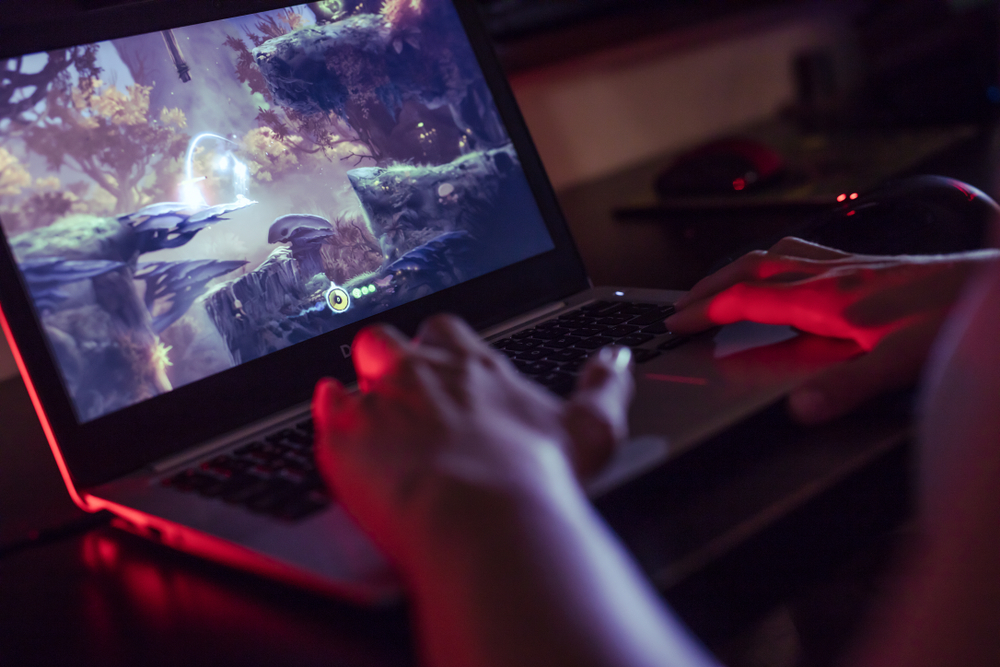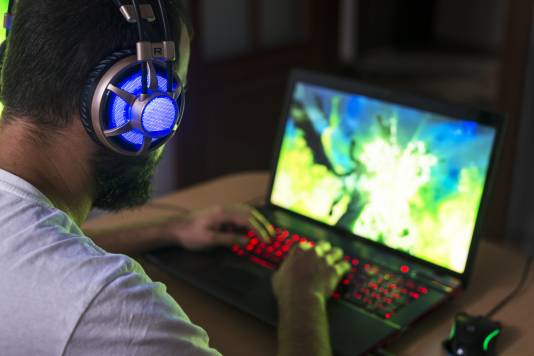This blog was updated in April 2024.
If you’re even remotely familiar with the world of gaming, then you’ve no doubt heard of gaming laptops. They offer a small and compact platform that moves gaming away from the desk – and as technology has improved, using a laptop for gaming has become increasingly popular in recent years. However, if you’re new to the world of gaming, then you may well be asking ‘What is a gaming laptop?”
Don’t worry – we’re here to help. And if you already consider yourself to be a dedicated gamer, you might be wondering if the portability and transportability of laptops is worth it compared to the power of a standard gaming PC.
To help you decide if a gaming laptop is for you, we’re explaining a little bit more about them, what features they include, and their pros and cons.
What is a gaming laptop?
A gaming laptop is a small and mobile personal computer, which has its own built-in screen and is specifically designed to enable gaming on the move and in spaces where you don’t have access to a desk.
At their core, they’re the same as standard or business laptops, but with plenty of upgraded features – it’s these upgraded features which make all the difference and allow users to game.
In a nutshell, a gaming laptop gives you get high-performance speeds, substantial memory capacity, triple-A graphics, and fast processing power.
These laptops are designed and manufactured specifically with advanced gaming needs in mind, so that you can go into battle armed with the power you need to smash the competition, no matter if they’re human or AI.
With high-end hardware included, gaming laptops are generally much more expensive than entry-level laptops, but they offer a substantial upgrade for even basic laptop functions.
What are the key parts in a gaming laptop?
There are four primary aspects of a gaming laptop. The operating system, screen size, processor, and graphics card, but there are plenty of other features you’ll want to consider as well if you’re thinking of buying one.
Modern computer games generally require additional processing power for them to run smoothly, and one of the most significant differences between a standard laptop and a specialist laptop for gamers is video processing.
Gaming computers have a video card, which is a PC component used to enhance the quality of images shown on a screen. They also have their own dedicated RAM, a GPU, and a cooling system, whereas a typical PC generally uses an onboard graphics controller and fans instead.
So, in simple terms, a laptop that’s designed for gaming contains additional power and has all the attributes needed to play games in high quality and at high speeds.
Below are all the parts you’ll need to consider in a laptop for gaming, and what their function is.
The operating system
The operating system (OS) is one of the most important aspects of any laptop. Not only does it allow you to run your computer, but it determines what games you can actually play.
This means that certain games you want to play might not be playable on your system, so it’s worth checking out which games you can play on which laptop before you spend any of your money.
There’s nothing more frustrating than buying a gaming computer and not being able to play the game you’ve actually bought it for!
The graphics card
The graphics card, or GPU (Graphics Processing Unit), is perhaps the most important component in your gaming laptop after the operating system, as it allows games to be played with higher graphics settings and with more visual effects enabled.
It delivers the images on your screen by processing the data and transmitting the signal to the monitor. Due to how stressful this process can be when running games, you’ll likely need a GPU with its own dedicated memory, called VRAM (video memory).
A 9th or 10th generation Nvidia graphics card will do everything you need to ensure you can game at the level you want to.
As for memory, most people will tell you that when it comes to memory, “the more the better” but the truth is that the average gaming enthusiast should be able to do everything they want with 4GB of VRAM. But 6GB would be even better.
Of course, there’s no need for you to get bogged down with tons of technical detail. When your laptop arrives it’s all ready to turn on and play.
The screen
It’s common sense, if you’re playing some earth-shattering game with brilliant graphics and sound effects, that you’ll want to experience the action on the biggest screen size available in whichever format you decide to go for.
While a gaming laptop screen will be more than adequate for most gaming experiences, if you’re so inclined, you can link a bigger screen to your laptop via an HDMI cable.
The only downside to this is that performance might be affected, and if you were going to do that, you might as well just buy a desktop PC instead.
Screen brightness
Surprisingly, screen brightness is often an area that’s overlooked in laptops and desktops alike, but it’s important that you get a screen with a bright display because it will stop you from squinting when the sun shines on it.
If you’re one of those gamers who play in your dark dungeon and basically never see the light of day, then screen brightness won’t be your main consideration. However, if you want to find out more about what is called ‘brightness metrics’ it’s not always straightforward, as some specification sheets don’t give the details.
A good maximum display brightness is 320 nits (usually that means 300 nits’ average brightness). Anything below 240 nits of maximum (220 nits of average brightness) is not good for a laptop.
Screen resolution
Screen resolution refers to how big your screen is. 1920 x 1080 is the minimum resolution you’ll need for any gaming laptop to play most games. Anything less and you’ll get graphics which aren’t sharp enough for effective gaming.
Touch screen function
Some gaming laptops now have touch screens, which is a definite benefit if you’re playing games such as Candy Crush, Darkest Dungeon, or Galaxy of Pen & Paper. Though, while touch-screens make sense for particular types of games, a touch-screen is unnecessary on most gaming PCs.
Peripherals and extras
Any gaming laptop is expected to support additional options which a standard laptop may not. Your laptop should be able to accept peripherals, such as a headset and a wireless mouse, often connected via USB ports and Bluetooth cards.
A gaming laptop should also be able to connect to the internet and to LANs (local area networks), usually through Wi-Fi and Ethernet, so you can game wherever you need to.
Internal cooling
Unlike standard laptops, gaming laptops have improved cooling options, such as better venting or more powerful fans. Since hardware pushed to its limits for long periods of time will generate significant heat, especially when playing high-end games, laptops need to be equipped with the means to keep themselves cool.
What is IPS in a gaming laptop?
IPS stands for ‘in-plane switching’, screen technology that enables you to see a wider range of colours and display graphics in greater detail. Having an IPS panel in your laptop is recommended for the best gaming experience.
What is G-Sync?
No, it’s not the name of a boyband. G-Sync is a piece of NVIDIA tech housed in certain high-performance laptops to increase their performance, with a focus on reducing input lag and eliminating screen tearing.
AMD’s FreeSync also does the same job and both G-Sync and FreeSync offer even faster rendering without introducing stuttering into the mix.
How much RAM do you need for gaming and work?
RAM is one of the most vital components in any computer. Generally speaking, 8GB of RAM should be more than enough for your starting amount of operational memory.
But if you’re a multitasker who operates with a number of applications, heavy-duty games, and tabs open in your browser at the same time, you may need up to 16GB. Check to see if the gaming laptop you’re looking at is upgradable to see if you can add more RAM at a later date.
Are SSDs or HDDs better for gaming?
When it comes to hard drives, you can find some affordable models with 1TB of capacity, meaning that you’ll have plenty of space to install and run all your games. They’re also easy to find and there are a lot of versions available.
All gamers do need plenty of space, so we can deduce that the minimum size of an HDD should be around 512GB. When it comes to reliability, HDDs are reasonably reliable and durable as well.
However, while HDDs are a good choice, SSDs are the ideal choice. They’ll make your computer run much faster, and therefore gaming will be more satisfying. They use less energy, and they’re more durable while producing less heat and noise. All of this makes them ideal for all users, not just gamers.
Do gaming laptops look different?
There are lots of gaming laptops which look pretty much like any standard laptop, but gamers do tend to like computers which have a ‘gaming look’ about them. So more and more laptops are decorated with bright colours, metallic finishes, large icons and prominent ridges which give that high-tech look.
Gamers are increasingly going for a look which differentiates a gaming laptop from a standard one. It’s cooler to be a gamer than an office worker, isn’t it?
How much is a gaming laptop?
Like all computer hardware, the price of a laptop made for gaming will vary depending on their make and model. Generally speaking, a good quality gaming laptop will cost you at least £500, but the most expensive can be well over £3,000
Fortunately, you don’t need the most expensive models unless you plan on running every game at maximum while streaming and recording it simultaneously. A £700 laptop with the right specs will be more than capable of running most games at max settings.
How long do gaming laptops last?
In terms of hardware lifespan, a laptop can last you anywhere between 5 and 10 years. One of the best things about many laptops designed for gaming is their modular construction, allowing you to upgrade a laptop should you desire.
But, as with TVs and computers in general, laptops can get outdated rather quickly, and you might find you need to buy a new one after only a few years in order to play the latest games.
Are gaming laptops inferior to desktop gaming computers?
Gaming laptops are sometimes criticised as being inferior to traditional desktop gaming PCs, but laptop technology is advancing at a fast rate, and there’s a growing number of gamers who are moving on to laptops as their primary gaming machine.
As laptops are smaller, the internal components of a gaming laptop are usually slightly less advanced and more expensive than similar parts for a desktop PC. Laptops are definitely more difficult to upgrade compared to desktop PCs – due to a combination of lack of component variety and limitations with space.
On the plus side, laptops are portable, which is a huge benefit, but a full gaming rig with really high specs and cooling will probably be able to offer more power than a laptop.
The pros and cons of gaming laptops against normal laptops
When it comes to choosing a gaming laptop over a regular laptop or a dedicated gaming PC, it can be helpful to look at the pros and cons, so you decide if a laptop is really the right choice for you.
Pros
High speeds: Gaming laptops are designed and manufactured to give you speed. You need as much speed as possible when you’re gaming so that you can overcome your opponents. When you play games, there are lots of tasks being processed simultaneously, which need a high-end CPU to function effectively.
RAM: RAM allows your computer to perform many of its everyday tasks, such as loading applications, browsing the internet, editing a spreadsheet, or experiencing the latest games, without issue. Memory also allows you to switch quickly among these tasks, remembering where you are in one task when you switch to another task.
Graphics: Laptops designed for gaming have high-quality graphics cards which provide high-resolution quality images and are a huge contributor to a gaming experience. Graphics cards provide support to games and graphics related software so that tasks can run smoothly without any interruptions.
Sound: The sound quality on a gaming machine is generally much better than on a standard laptop. Audio quality is really important when gaming. It’s no good having razor-sharp, fantastic animation but tinny or lacklustre sound.
Upgradable parts: Like PCs, some laptops are now more flexible and have upgradable parts. Processors, memory, mouse, touchpads, and peripherals can be easily changed. This means you don’t have to replace your laptop as time goes by, you can just upgrade it. However, this only applies to “some.” Most gaming laptops are NOT great for upgrading. Check out what you can and can’t upgrade before you buy.
Durability: Lastly, gaming laptops are built to be sturdier and more durable than normal laptops, letting them take knocks during travel and gaming without suffering damage.
Cons
Battery life: Unfortunately, laptops for gaming tend to have much less battery power than normal laptops. You really need to be near a power source to get the most out of your laptop.
Weight: Gaming machines weigh more than a standard laptop, so make sure you have an appropriate laptop bag to carry the extra weight. They can be bulky, as they have to prioritise function over design since additional exhaust fans need to be installed on laptops in order to compensate for all the heat built up whilst games are running.
Performance: Laptops usually can’t provide the same level of performance as desktop PCs. They use mobile versions of graphics cards and other components which provide lower performance overall, so it may be that some of the more demanding games might not be as effective.

Screen size: Your screen size is going to be limited on a laptop as they’re portable machines. Yes, you can connect a laptop to a screen through an HDMI cable, but this will put a greater load on your laptop’s graphics card.
Extra costs: As a gamer, you’ll also need a specialist gaming mouse, keyboard, and other accessories to make the experience as good as it can be. This will mean you’ll incur additional costs. If you’re serious about gaming, then buying a backlit keyboard is a must if you want to throw an ‘all-nighter’!
Can you use a gaming laptop as a regular laptop?
Yes, you can. It’s a simple answer to a question which many people ask. A gaming laptop can do anything a normal laptop can do; it just lets you game as well.
Like we said at the start, a laptop that’s designed for gaming is pretty much like any other laptop in that it has a CPU, temporary storage space (RAM), permanent storage space (hard drive, SSD or cloud storage), and more.
The difference is that a specialised laptop typically has more powerful components and more RAM and storage as games are very demanding on hardware resources.
Both types of laptops are capable of doing all the usual day-to-day home and office admin tasks, internet shopping, and streaming. If you want to game, then a standard laptop might be able to handle it depending on what the game is.
You’ll need to seek advice on specific games. The latest games need a lot more power and functionality all round, so for those you’ll need a powerful laptop to experience triple-A games at their best.
Can a gaming laptop be used for work?
Nothing’s stopping you from using a gaming laptop for work. In fact, this is exactly what a lot of people in creative and digital industries do. It’s not as if the hardware of a gaming laptop is limited to games. These high-wattage CPUs and dedicated GPUs are just as well suited to rendering out 4K videos, animating complex 3-D meshes, combing through vast swathes of data, and much more.
An everyday laptop equipped with a power-sipping chip simply doesn’t cut it in more resource-intensive applications and workloads – especially in the GPU department. A mobile workstation, or in more and more cases a gaming laptop, is a much better alternative.
Battery life takes a big hit
That said, there’s certainly some downsides to using a gaming laptop as your main work machine. A gaming laptop isn’t designed for on-the-go productivity. It’s designed for, as the name implies, gaming. This has a number of implications for users.
For one, energy efficient is largely thrown out the window in favour of raw performance. Gaming laptops are seriously power-hungry. Try to do anything remotely intensive on a gaming laptop while off charge and its battery will drain in an instant. To get the most out of a gaming laptop, it really ought to be plugged in 99% of the time.
Even when you’re just surfing the net and typing up a report for work, a gaming laptop’s battery life hardly compares to that of a traditionally productivity-focused device. You’re look at roughly 4-5hrs battery life on the average gaming laptop compared to, say, 15-20hrs on the latest Apple MacBook.
Portability, Noise, and Connectivity
Again, a gaming laptop prioritises performance above all else, so its portability is less of a concern. As to not overheat, or ‘thermal throttle’, at the slightest load, gaming laptops are backed up by some rather hefty heatsinks. These help to keep the CPU and GPU cool, even when they’re churning out hundreds of frames per second.
On the flipside, they contribute a decent amount of weight and thickness to the device. And since a gaming laptop doesn’t have the kind of battery life to last a whole work day, you’ve also got to factor in the weight of its power brick and charger. All in all, while you can technically carry a gaming laptop around in a bag, it won’t make for the most comfortable experience.
Not to mention the noise. The fans of gaming laptops must work overtime to dissipate all the heat generated by these powerful components. This isn’t ideal in an office environment. However, the increased thickness of gaming laptops does allow them to cram in additional connectivity: full-sized USBs, ethernet jacks, and so on. It’s a nice change of pace from thin-and-light laptops which have trended towards less and less ports.
In-your-face design
The look and feel of your average gaming laptop isn’t exactly subtle, either. A flashy, colourful keyboard and light-up ‘Republic of Gamers’ logo may not make the best impression in a professional setting. And even if you manage to disable all the trippy lighting effects, the sharp, angular design of most gaming laptops screams “I’m a gaming laptop.”
Fortunately, head on over to ebuyer and you’ll find some gaming laptops which possess a more understated aesthetic. Take the Razer Blade line-up, for instance. With a sleek, CNC-milled aluminium unibody, the shape and form-factor of a Razer Blade isn’t too dissimilar to that of an Apple MacBook.
How do you use a gaming laptop?
This may sound like a stupid question, but there’s more to this than meets the eye. A gaming laptop can be used like other laptops which we use for the usual day-to-day tasks and entertainment purposes. These laptops have the same operating systems which we use on our normal laptops or PCs.
The only major difference is that people who buy gaming laptops are buying them primarily for (surprise) playing games – so they want a laptop which is going to deliver the best performance, with high-quality graphics, sound and speed. Laptops for gaming advanced features, system specifications, and durability, making gaming laptops unique.
Internet surfing, web browsing, emails, chatting, and other activities are pretty much like when you use a standard laptop. In addition, some laptops have hard keyboards, like PC keyboards, due to the demands of gamers who like special keyboards and mice to control their play.
Is a gaming laptop worth it?
At the end of the day, whether or not a gaming laptop is worth it will come down to personal preference. Do you want to be more flexible where you game or have a smaller budget? If yes, then a laptop made for gamers is ideal.
If, on the other hand, you’re serious about dedicated gaming from home, then a gaming rig is likely your best option.
No matter if you want a gaming laptop or a gaming desktop, we’ve a huge range of both over in the Ebuyer store. Start browsing today to find the best deals and don’t forget to visit the Ebuyer blog for more guides like this one.





